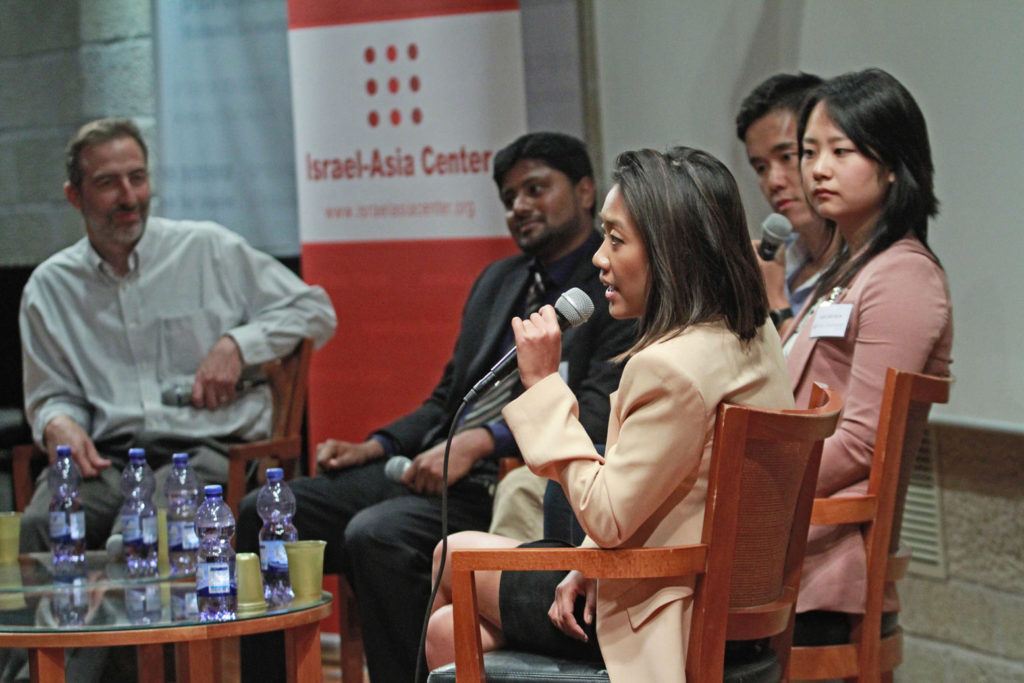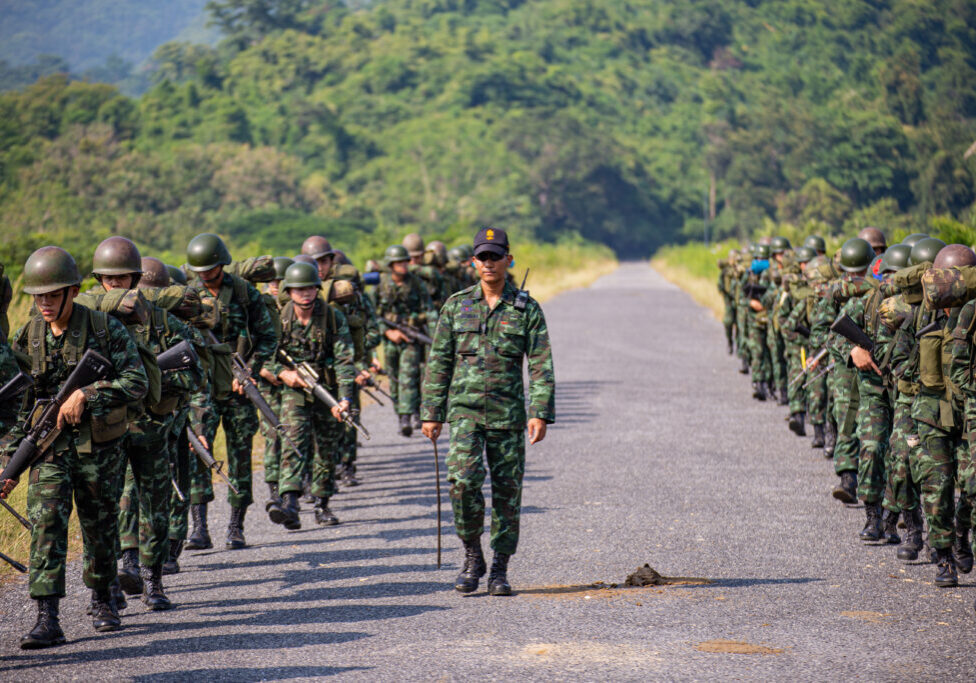Australia/Israel Review
Israel looks to Asia’s next generation
Jul 2, 2012 | Yehonathan Tommer

Yehonathan Tommer
In recent years, Israel has been coming to sees its future as increasingly linked with Asia. This fact is underscored by changing strategic realities, the region’s influential emergent economies, and American and European woes in an unresolved global financial crisis. Three of the world’s largest economies (Japan, India and China) are Asian, and four out of every seven persons on this planet live in Asia.
The Jerusalem-based Israel-Asia Centre (IAC), established in 2009, aims to promote a shared future, “investing in the next generation of leaders in Israel-Asia relations, by building dynamic networks to maximise their continued engagement and cooperation.”
In June, the IAC organised a panel on future Israel-Asian partnerships at a certificate-awarding ceremony concluding an inaugural eight-month Israel-Asia Leaders Fellowship program. Twelve mainly graduate and post-doctoral Asian students from China, India, Japan, Singapore, Korea and Taiwan currently pursuing academic study programs in agricultural, environmental and Middle Eastern studies at Israeli universities participated in the program.
Asian-Israel experience
The Fellowship supplemented their regular academic studies by exposing them to Israel’s innovation-oriented and entrepreneurial economy and providing a networking platform for reaching out to Israeli professionals and Asian counterparts studying and working in Israel.
The Asian Fellows attended seminars with Knesset Members, government officials, Israeli diplomats and top business people, entrepreneurs, representatives of trade and non-profit organisations and journalists. They participated in field trips and workshops to learn about Israel’s contribution to a range of innovative technologies; they carried out assignments to acquire leadership and project management skills; and they presented a project they prepared to promote Israel-Asia relations. Each Asian Fellow was matched with an Israeli professional mentor in his or her field of interest offering industry insights, career guidance and contacts. Fellows were also placed as interns in Israeli companies with Asian interests and operations.
“Israeli universities offer Asian students a niche bracket of academic studies interfacing common national interests. The students are an important human resource which has been largely overlooked. We felt that with the right networks, exposure and training, they were prime candidates to become the next generation leading Israel’s future partners in Asia… and that we need to invest in these future partners in order to create a stronger relationship between Israel and Asia in the future,” IAC’s Founder and Executive Manager, Rebecca Zeffert, said at the Jerusalem panel.
Singer: “We live in an Asian-Centreed global market”
Panel moderator Saul Singer, a former Jerusalem Post columnist and opinion page editor, and co-author of the 2010 business best-seller Start-Up Nation: The Story of Israel’s Economic Miracle, advised Israelis to switch their focus from a Western to an Asian-centred market. “Israel has not really absorbed changing world realities,” he said. “The world has moved from a US-centred global market – largely an American creation – to an Asian-centered global market growing faster than the American economy.”
Singer’s book has been translated into Chinese, Korean and Japanese. It’s a best seller in India and Singapore and is recommended reading for government officials in China’s Jiangsu province.
The Israeli model of innovation and entrepreneurship is not going to be transplanted to Asia’s different realities, but Asians can apply Israel’s lessons, he said. “Israel and Asia can benefit from each other’s strengths and channel their human and cultural resources into partnering projects that create a better and more sustainable global economy and environment,” Singer said. “Governments can be facilitators by creating a favourable environment but individual business people must get out there and form the partnerships.”
Partnering cultural strengths
The four panelists from Singapore, India, China and South Korea urged Israeli entrepreneurs increasingly to turn east from their traditional western orientation and initiate partnerships with individual Asian firms, enterprises and start-ups.
Singapore’s Sharon Teo told the AIR that her country and Israel make ideal partners. “We are two small countries with small populations and no natural resources; but with creative and educated societies. We already have a strong and close defence relationship, but there are business prospects in sustainable green energy projects and clean tech incubators that can carry the two countries from conceptualisation to commercialisation, well beyond their defence relationship.”
Teo, 27, a graduate of Singapore’s Management University, is working towards a Master’s degree at Tel Aviv University’s Porter School of Environmental Studies focusing on solar energy independence strategies for the West Bank and developing markets.
China’s Howe Wang, 26, said it was very important for Israelis to personally engage Chinese companies and their directors. “China is a centralised society, but government officials have limited knowledge of the way individual Chinese businesspeople operate,” Howe told the Jerusalem Post. “The Chinese Government only has so much to say and you really need to engage the companies themselves. Go there and leverage the connection you have,” he advised Israelis.
To this end Howe has been consulting with the Chief Scientist’s Office in the Ministry of Industry, Trade and Labour on teaching Israeli firms how to communicate with Chinese investors and wedge into Chinese social networks.
Srivignesh Sundaresan, 27, an Indian agricultural researcher from Tamil Nadu, told AIR that “a dream came true” when he visited an Israeli experimental R&D station for the first time. “I had heard so much about Israel as an agricultural expert back in my undergraduate days that one of my professors even said ‘Guys, let’s move the class to Israel.'”
Srivignesh is completing his doctorate in plant science at the Hebrew University’s Faculty of Agriculture, Food and Environment. During his doctoral studies Srivignesh initiated a partnership between the Indian biotech company Genotyping and his Israeli doctoral supervisor for making a custom microarray chip. When he returns home, Srivignesh plans to provide agricultural extension services and training to farmers in his region, based on Israeli know-how adapted to Indian conditions.
Many of the Asian Fellows noted the Jewish-Israeli penchant for querying and arguing ideas, which helps, they believe, to explain a “mentality of constant dissatisfaction that carries the seed of Israeli innovation.” They firmly identified with Israel’s family-oriented values, and were won over by Israeli informality, friendliness and accessibility to persons in senior positions, which they juxtaposed with Asian societies characterised by hierarchy, respect for authority and adherence to strict rules of behaviour.
On the other hand, many were critical of the ignorance many Israelis displayed of Asian society, its cultural diversity and customs, which Teo labelled as a “backpacker’s” understanding of Asia.
Networks of the future
As part of Israel’s growing involvement in Asia, this year’s 8th annual Asia Science Camp will be hosted, at a cost of over US$1 million, at the Hebrew University of Jerusalem in the last week of August. Some 250 young people, aged 17 to 21, are expected to attend from 30 principal countries across Asia. The prestigious five-day summer camp, focusing on physics, mathematics and the exact sciences, was conceived by Nobel Chemistry Laureate Yuan Tseh Lee of Taiwan, and Nobel Physics Laureate Masatoshi Koshiba of Japan.
With an eye to longer term relations, starting this academic year 2012-2013, Israel will award annual government scholarships to 150 outstanding Chinese students at Israeli universities. Another 100 government scholarships for post-doctoral studies in Israel will be awarded to outstanding students throughout Asia in engineering, business administration, and the exact and life sciences.
Together with the American Jewish Committee, AIJAC has been sponsoring visits to Israel by South and Southeast Asian officials, journalists, entrepreneurs, academics, religious leaders, security officers and others since 2006 under the Rambam Asia program. The growing eagerness to expand on such relationships emanating from Israeli governments, as well as NGO and business elites initiating their own new programs, seem to demonstrate that such bridge-building efforts have started to gain a momentum of their own.






